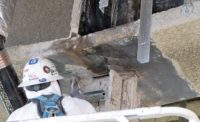Integrated Viral Protection reports it has sold $15 million worth of the standalone version of the patent-pending Biodefense Indoor Air Protection System since the virus-killing air filter’s launch last August. And there is $10 million worth of product “ready to sell,” says Garrett K. Peel, IVP’s co-founder and managing director.
IVP and its partners are just warming up. Coming within two months is a “cost-effective” retrofit application for large-building air handlers, says R.O. Hunton, chairman of the heating, ventilating and air-conditioning system distributor the Hunton Group. Hunton, a distributor of IVP filters since Dec. 1, is fine-tuning the retrofit system using its own headquarters building.
A super-charged HEPA filter, the IVP technology uses high heat, the virus’ natural enemy, to kill coronavirus and other airborne pathogens. Using heat was a “simple idea,” says Zhifeng Ren, the director of the Texas Center for Superconductivity who, with filter mastermind Monzer Hourani and postdoctoral fellow Luo Yu, is a co-inventor of the technology.
Hourani, IVP’s founding chairman and ENR’s 2021 Award of Excellence winner, claims the IVP device is the only air filter proven to destroy 99.999% of the coronavirus, 99.8% of anthrax spores and also other airborne pathogens. And it does so instantaneously, in a single pass, without noticeably upping the ambient air temperature. Nothing can survive biologically because the filter is heated from 89° C to 200° C, says Peel.
A key aspect of the design is a nickel foam mesh filter, says Ren, who is now IVP’s scientific advisor. Another key aspect is that the heating element uses only electrical pulses—not constant power. That makes the total power to the filter, and heat to the air, negligible. The filter may increase cooling system operating costs 1% to 2%.
Mobile IVP units range from $750 to $9,999, depending on capacity. A HEPA filter, equivalent in size to IVP’s $750 device, is $300 to $400 (see p. 8). The price differential is going to disappear in a few months, says Kevin Murphy, Hunton’s vice president of business development. Operating costs are already on par, he adds.


Post a comment to this article
Report Abusive Comment